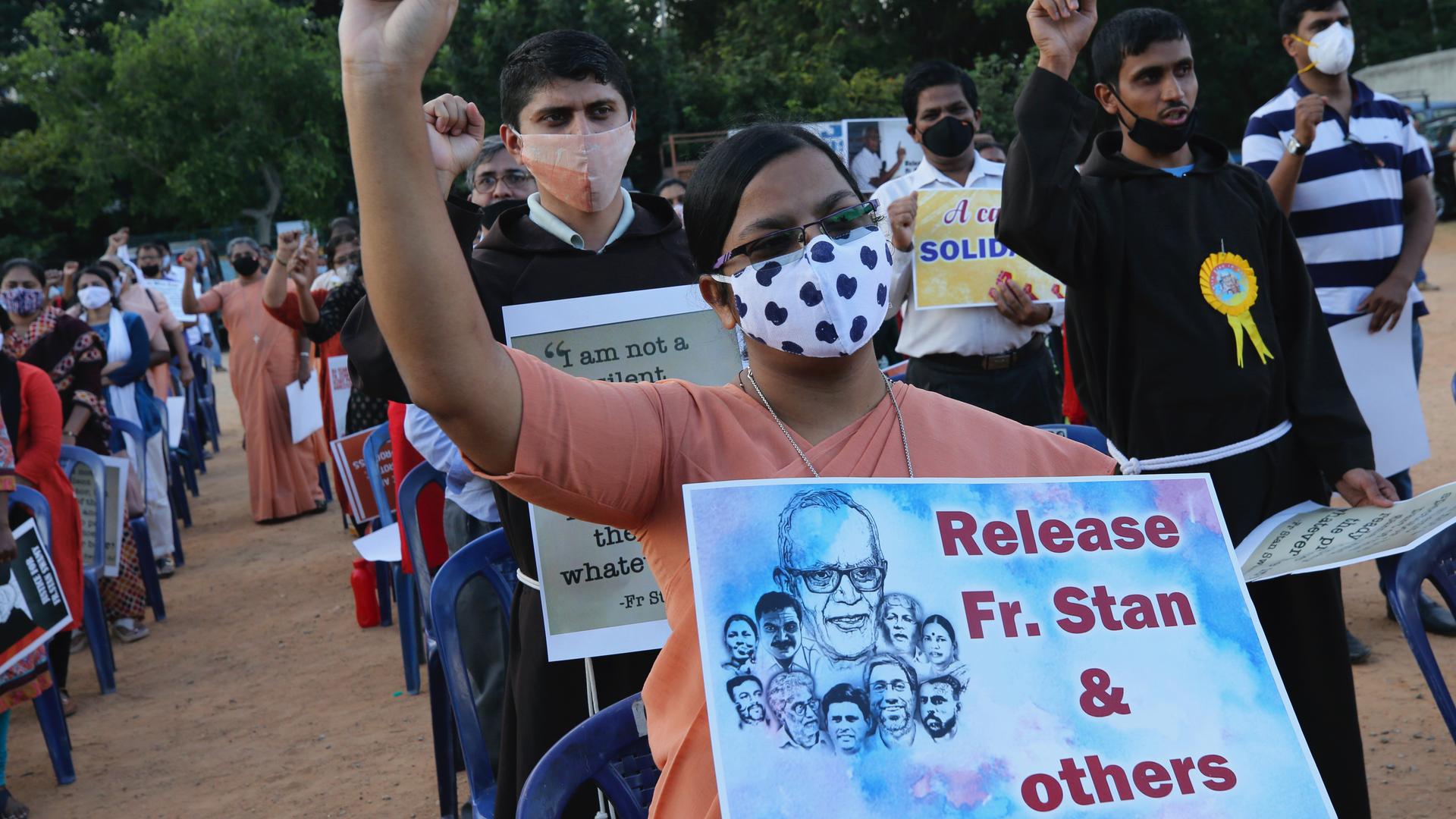Indian activists hope elderly priest’s death marks a turning point for human rights in India
Rev. Stan Swamy, well-known for his human rights work, got COVID-19 while jailed in the eastern Indian state of Jharkhand for nine months.
He had Parkinson’s disease, and his hands shook, so he needed a straw to drink — but he waited weeks before his jailers gave him one.
Swamy died on July 5.
Related: US human trafficking report elicits anger from several countries
The 84-year-old Jesuit priest was accused of terrorism based on evidence that has since been discredited by international experts. The Indian government said he died of medical causes, but now, officials from the US and United Nations are expressing concern about the circumstances of his death — and Indian activists hope their pressure could force a turning point for human rights in India.
“He didn’t die [naturally], it was a custodial murder. People are saying he’s becoming an international martyr for human rights. His death will not be in vain.”
“He didn’t die [naturally], it was a custodial murder. People are saying he’s becoming an international martyr for human rights,” said Alpa Shah, an anthropologist at the London School of Economics and Political Science, who knew Father Swamy. “His death will not be in vain.”
Related: Lawsuits bring attention to caste discrimination in the US
Swamy devoted his life to the cause of the Indigenous people of India — called the Adivasis. He once explained why to Aashish Xaxa, one of many Adivasi activists who considered Swamy a mentor.
“He said that the Adivasis are the only community in India who are not materially driven,” Xaxa said. “And he gave me an example to highlight that.”
He said Swamy told him about a time when he was sitting underneath a mango tree with a young Adivasi student and his father. The young man climbed the tree to get mangoes for them. He came down with three pieces of the fruit. Swamy looked up and saw that one ripe mango had been left hanging on a branch.
“He thought that the student had missed it. Maybe he couldn’t see it or he couldn’t climb it. So he asked, ‘Did you miss that mango?’” Xaxa said. “And that student, he just looked up casually and said, ‘Oh no, that mango is for the birds.’”
Related: Twitter’s ban on actor Kangana Ranaut could lead to confrontation with Indian government
The Adivasis’ universal respect for nature stunned Swamy. For three decades, he stood alongside them as they fought to preserve forests and mineral-rich land.
Still, the government paved the way for wave after wave of industrial development. In a recording Swamy made before he was arrested and jailed, he warned that the government was cracking down on activists. He said officials were detaining thousands of Adivasi activists fraudulently — charging many with sedition or terrorism, and holding them in overcrowded jails indefinitely, without trial.
“Adavasi people are speaking up. They are also paying the price for doing so,” Swamy said. “I believe we Indians are at a crossroad of choosing justice and truth versus injustice and untruth.”
Swamy said too many Indians were remaining silent. But there’s hope that’s changing now, after the priest’s death.
“I think people who think that free speech is important, people who feel that the idea of India is getting eroded in a particular way — most of them are now questioning — are actually now thinking and coming together on this issue that we really have to fight for our political prisoners who have dedicated their lives on issues like these.”
“I think people who think that free speech is important, people who feel that the idea of India is getting eroded in a particular way — most of them are now questioning — are actually now thinking and coming together on this issue that we really have to fight for our political prisoners who have dedicated their lives on issues like these,” said Akriti Bhatia is a labor rights activist in Delhi.
Related: Pakistan mourns I.A. Rehman, the country’s ‘father of human rights’
She said the situation has become more fraught in the wake of COVID-19 as Prime Minister Narendra Modi tries to improve the economy. He’s weakened protections for natural resources, and there’s been a massive expansion of coal mining. Advisi activists like Gladson Dungdung, who worked with Swamy for many years, are bracing themselves.
“[The] way forward is not very easy but the clear thing is, you know, we are also not going to surrender. We Adivasis are determined to fight to reclaim our land, territory and resources. We are not going to leave it,” he said. “So [the] fight will go on.”
The government made a mistake if it meant for its treatment of Swamy to serve as a warning to other activists, said the priest’s friend, activist Xavier Dias.
“I’m not afraid to die for the cause,” Dias said. “They have hit a hornet’s nest by taking Stan, and it’s going to backfire badly. Because it exposed the character of the Indian state today.”
